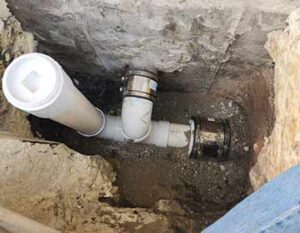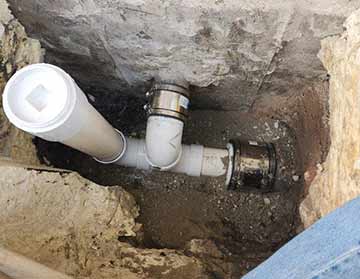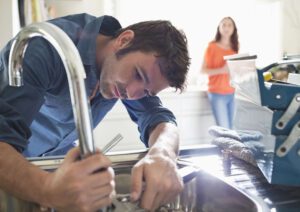When a sewer line is damaged, it can leak toxic sewage into your yard and cause major plumbing problems. Repairing a broken sewer line is expensive and requires extensive digging.

Fortunately, modern technology makes it possible to perform a trenchless sewer repair that saves you money and time. Read on Local Law 152 to learn more about this innovative technique here.
We’ve all experienced a drain that doesn’t quite work as it should. Whether it’s standing water in the bathtub during a shower or a garbage disposal that spits food back into the sink, clogged drains are frustrating and annoying. However, they don’t have to completely disrupt your daily routine. While some clogs require a professional to resolve, others can be tackled by the homeowner with little to no up-front cost.
Generally, clogs form over time, as food, hair, grease, soap scum, and other materials stick to the walls of the pipes. The accumulation of this material causes the drain to slow down or become completely blocked, preventing wastewater and waste from passing into the sewer system or septic tank.
It is important to address clogged drains as soon as you notice them. This will prevent them from getting worse, which can lead to expensive repairs and possible damage to your pipes. In addition, it can also prevent sewage from backing up into your home, which is a hazardous and unpleasant situation that needs to be addressed immediately.
There are several different methods for tackling clogged drains, but the most effective is usually to use a hand-held snake or plunger. If you can’t reach the clog itself, try using a wire coat hanger or a pair of pliers to remove it. If these tools aren’t available, try running hot water down the drain for a few minutes; this can often dissolve the blockage.
In some cases, clogs are caused by hard water that contains minerals that build up in the pipes and prevent draining. In these cases, it is a good idea to install a water softener in your home.
It’s also important to keep your trees trimmed and avoid planting anything in the area of your sewer line. Over time, tree roots can penetrate and cause clogs in your drain pipes. If you notice any problems with your drain lines, it’s important to contact a plumber as quickly as possible to minimize any potential damage. In some cases, a professional may be needed to unclog your drain line and perform a thorough inspection to identify any potential issues that need repair.
Slow Drainage
There are several possible reasons for your sink draining slowly, from simple clogs to broken pipes and even sewer line issues. While there are some clogs that can be resolved at home with a little elbow grease (using a snake or plunging), many will require professional help to be addressed.
First, try sending a cascade of water down all your drains. Begin by plugging all of your tubs, showers and sink drains, then have someone stand next to each one and open the faucet at the same time. This can dislodge any debris that may be clogging the line and will wash away any hair or soap scum that is collecting in the drain.
You can also try pouring hot or boiling water down the drain. This can dissolve a lot of the buildup that causes slow draining, especially in sinks. You can also clean out your garbage disposal or use a drain cleaning product that is safe for your pipes.
If these home solutions don’t work, it’s likely a more serious problem. The clog could be deeper in the drain pipe or it could be an issue with your main sewer line. If you suspect this is the case, it’s important to call a plumber right away to avoid more costly damage.
Professional measures to fix a slow drain include using drain inspection tools to see what is causing the blockage and determining the best method for clearing it. Plumbers can also perform regular plumbing services on your drain lines to catch and repair any small problems before they cause major trouble.
If you’re looking for a plumber to help with your slow drains, contact the plumbing professionals at Ongaro & Sons. We have 38 years of experience serving Marin and Sonoma counties, and we know how to get your drains flowing smoothly again. We can handle both residential and commercial drain clogs, so call us for fast, friendly service. We are committed to providing the best customer care, so you can always count on our family-owned business for all of your drain needs.
Sewage Odor
When your toilet or other drains begin to smell, it could be a sign of a sewer leak. The foul odor is hydrogen sulfide, which is produced when organic waste decomposes in the pipes. This gas can enter your home through cracks and crevices in the plumbing system or through damaged or clogged sewer lines. If you smell sewage in your house, you should call a plumber immediately to have the line repaired.
It’s not uncommon for your plumbing to smell like sewage in the basement, kitchen or other parts of the home. This rotten egg-like smell can be caused by several issues, including clogged drains, toilets that take too long to flush and more. In some cases, a plumber may need to inspect the entire sewer system to find the source of the odor.
If you have a clogged drain that is producing a strong sewer smell, your plumber may recommend that you invest in a professional drain cleaning service to fix the issue. A drain cleaner can help clear away hair, grease and other debris that has built up in the drain. This can make a huge difference in the smell and function of your plumbing.
Depending on the location of the leak, your plumber may need to dig up sections of your sewer line and replace them. This can be a messy process, so you should prepare for some disruptions in your home life while the repair work is taking place. You’ll also want to move any items that are near the lines, such as furniture and plants, to avoid damage.
A leaking sewer line can be hard to detect, but a plumber will use a camera and other tools to determine the location of the line and identify the source of the leak. The plumber will then choose the best method for repairing the line, which can vary based on the type of pipe and its condition.
Leaky sewer lines can be fixed using a variety of methods, including patching, replacing and relining the pipes. Plumbers will also take into account any other below-ground obstacles, such as sprinkler lines, electric dog fences and more.
Damaged Sewer Line
A broken sewer line can cause major problems for your home. If left unchecked, it can expose your family to dangerous bacteria and lead to costly repairs. A quality plumber will inspect your home and the surrounding area to determine the source of the problem and recommend the appropriate repairs.
If your sewage system is constantly breaking down, it may be time to replace the entire line. This can be done using either traditional or trenchless methods. Traditional excavation involves digging a trench several feet wide and deep to remove the old pipe and install a new one. While this is an effective method, it is costly and can damage your landscaping and property. Trenchless options use smaller equipment that can work through existing lines to repair or replace them.
Whether you choose traditional or trenchless options, a qualified plumber will ensure that your new pipes are installed correctly and that any damage to the existing ones is repaired. This will include sealing any cracks and making sure that no debris is lodged inside the new pipes. In most cases, your plumber will recommend that you have a camera inspection of the existing sewer line to find the source of the problem.
While clogs are the most common sign that your sewer line isn’t working properly, there are other symptoms as well. A sudden influx of insects, such as sewer flies, cockroaches and silverfish, is another telltale sign that your line is broken. These insects can enter your home through the cracked pipes and cause serious health issues.
Other causes of damaged sewer lines include tree roots, soil movement and poor construction. If the roots of trees grow too close to buried lines, they can slowly crush and crack them. Earthquakes and other shifts in the ground can also cause them to break or leak. In some cases, older pipes can simply break down due to age.
If you notice any of these signs, call a plumber right away. A quick response can help limit the damage and protect your investment in your home.


